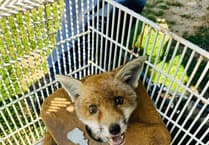Experts have warned that whilst it may be tempting for people to enlist their pets in helping to finish off the festive leftover, many of the festive foods enjoyed at Christmas can be hazardous to pets.
Dr. Jo Myers has provided top seven foods that pets should avoid including onions, leeks, chocolate, etc and what to do if a pet eats something they shouldn’t.
Dr. Jo Myers is a practicing vet on Vetster - a digital platform which connects licensed vets with pet owner.
Here are her foods to avoid:
1.Fat trimmings and bones
Eating too much of anything rich, fatty, or unusual — cooked or raw — can cause intestinal issues and stomach upset. Dogs are at especially high risk for a life-threatening bout of pancreatitis when they overindulge in a fatty meal. Bones aren’t toxic, but can get lodged in their esophagus or elsewhere along the digestive tract. These indigestible chunks can cause intestinal blockages which are fatal without treatment.
2.Raw or uncooked meat
Raw or uncooked meat can be bad for pets, just like it is for people. Raw meat can carry food-borne illnesses such as salmonella and E. coli.
3.Onions, garlic, leeks, scallions
Pets shouldn’t eat onions, leeks, scallions, or garlic. These vegetables damage red blood cells and eating enough of them can lead to hemolytic anemia. The effects of this condition are not always immediately evident, and can include lethargy, loss of appetite, rapid breathing, pale gums, and jaundice.
4.Chocolate and other sources of caffeine
Chocolate contains the methylxanthines theobromine and caffeine, both of which are potentially toxic to pets when consumed in significantly large amounts. Chocolate toxicosis symptoms include vomiting, diarrhea, hyperactivity, and seizures.
5.Milk, cheese, and other dairy products
Adult dogs and cats, like most mammals, are lactose intolerant. Once weaned, the consumption of a large amount of dairy products can cause stomach pain, vomiting, and diarrhoea.
6.Alcohol
Alcohol affects pets the same way as it does humans, but keep in mind dogs and cats don’t weigh as much. Dogs and cats that have been exposed to alcohol may act like they’re drunk, and higher doses lead to alcohol poisoning. Symptoms include: vomiting, trouble walking, disorientation, lethargy, loss of vision, seizures, slowed breathing, loss of consciousness, and in extreme cases sudden death.
7.Bread dough with yeast
Uncooked dough with yeast continues to ferment even after it’s been swallowed, and this produces alcohol. Large amounts of dough can produce dangerous amounts of alcohol as well as enough gas to cause potentially life-threatening intestinal distension.
When your pet eats something they shouldn’t:
The severity of symptoms often depends on the amount of the hazardous food your dog or cat has eaten. But if your pet has ingested any of the above foods or is showing signs of distress, call your vet right away. It’s always better to seek help sooner rather than later, and there’s no safe or effective way to induce vomiting for cats at home, so professional help is critical.




